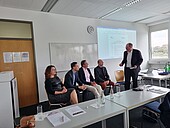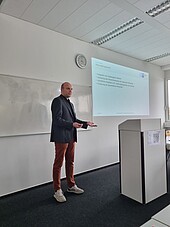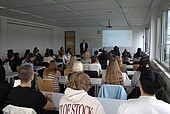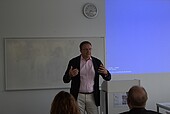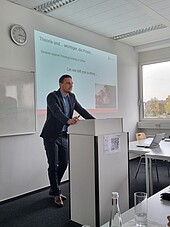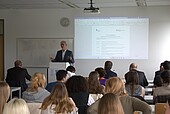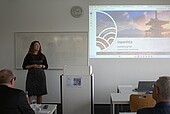Under the motto "Going International - Setting up a business abroad", the event was dedicated to the challenges and opportunities of international start-ups, particularly in Asia. Numerous students, people interested in founding a company and experts from various sectors took part in this inspiring afternoon.
Welcome and keynote speech
Prof. Dr. Frank Rövekamp, Director of the East Asia Institute, warmly welcomed the participants and emphasized the importance of intercultural understanding and international exchange for successful start-ups. Prof. Dr. Michael Graef from Worms University of Applied Sciences, a proven expert in the field of international start-ups, moderated the event. In his keynote speech, he explained that physical, temporal and cultural distances pose challenges for international start-ups, but also offer immense potential. Building a resilient network and the ability to recognize market imperfections are key success factors, he said.
Prof. Graef also emphasized that the experience gained during the studies at OAI represents enormous added value for future start-ups - particularly with regard to the Asian market.
Successful start-up experiences: From idea to reality
The experience report by Daniela Lange, a graduate of the East Asia Institute and founder of Japanista GmbH, was particularly inspiring. She has been running the company, which specializes in destination management for trips to Japan, together with Janis Klausenitzer since 2020. She gave the participants an insight into the beginnings of her start-up and emphasized the importance of a well-thought-out business plan and the networks she had built up during her year abroad in Japan. Her advice to budding founders: "Perseverance is key - don't be discouraged by setbacks and actively seek support."
Legal and tax aspects of international start-ups
Another highlight was the presentation by Thomas Hoffmann from Ecovis Rechtsanwaltskanzlei. He shared his experiences of setting up a tax and law firm in Beijing and highlighted the legal and tax hurdles that need to be overcome in an international context. He emphasized the importance of maintaining close contacts with embassies and political players, especially in countries like China where access to networks can be crucial.
Practice-oriented insights: success factors for international start-ups
Ralf Marohn, founder and Managing Director of Far Eastern Consulting, also impressed the audience with his start-up story. As one of the first graduates of the East Asia Institute, he ventured into self-employment and successfully established his company in the Asian market. Marohn emphasized that perseverance, confidence in one's own business idea and good contacts are essential in order to master the ups and downs of a start-up. Using a practical example, he showed how founders can recognize and successfully exploit untapped potential.
Support from the IHK Pfalz
Rafael Pekmezovic from the IHK Pfalz presented the various support services offered by the IHK for founders with international ambitions. From start-up advice and country- and customs-specific information to foreign trade promotion, the IHK offers comprehensive support for the step into foreign business. Founders can benefit from the IHK's many years of experience, particularly in Asia and Africa.
Q&A session and networking
The presentations were followed by a lively panel discussion, during which the audience put numerous questions to the experts. Afterwards, participants had the opportunity to clarify individual questions and make valuable contacts in personal discussions.
Conclusion: Successful networking and valuable impulses
Start-up Wednesday at the East Asia Institute was a complete success. The event not only provided in-depth specialist information, but also a platform for networking and exchanging ideas with experienced founders and experts. Students and those interested in founding a company were able to take away numerous ideas and concrete tips on how to successfully implement their own ideas internationally.
In view of increasing internationalization and the importance of the Asian market, the event clearly showed how valuable intercultural knowledge and persistent commitment are for a successful start-up abroad.

